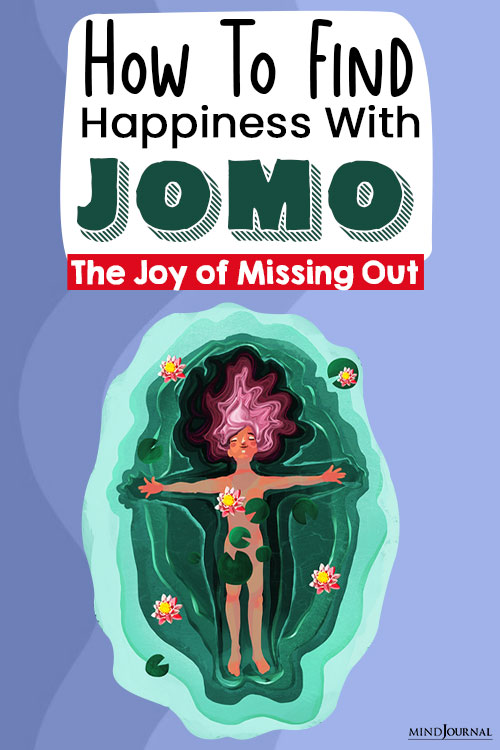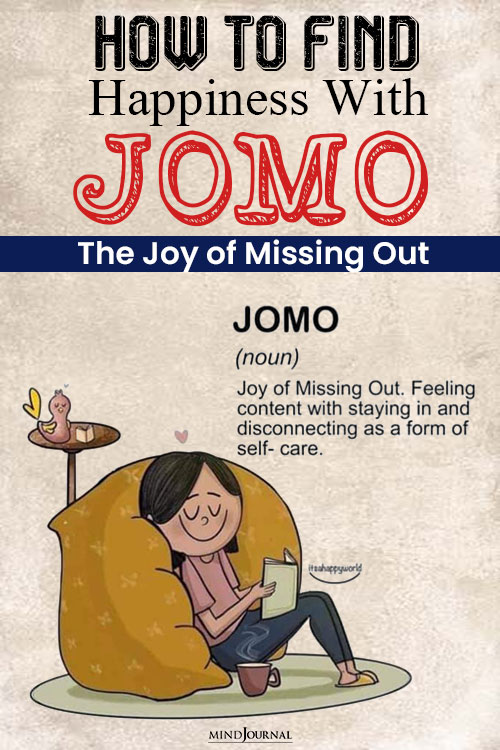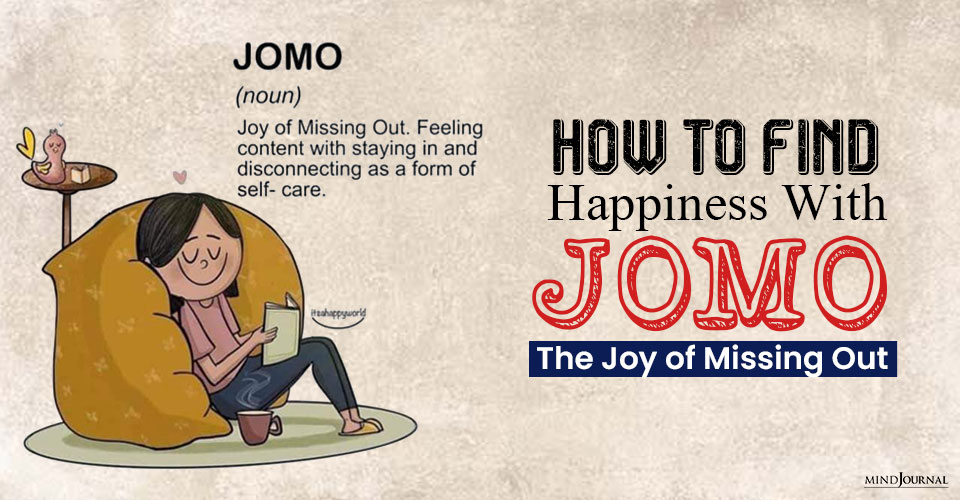Most of us are aware of FOMO or the fear of missing out and have suffered from its anxiety-ridden effects. But what about its cooler variant JOMO: The Joy of Missing Out? It’s time to welcome JOMO into your life and replace crippling “fear” with pure “JOY”.
What is JOMO?
JOMO, or the joy of missing out, refers to the pleasant feeling of enjoying your alone time and embracing detachment from socialization. It is about consciously unplugging from all the chaos around you, especially social media, taking a break and finding bliss in your personal time. The joy of missing out (JOMO) is about being mindful of the present moment, and enjoying the activity you are engaged in without feeling the need or compulsion to share it on social media or being keen about knowing what others are doing.

The meaning of JOMO is the polar opposite of FOMO. The joy of missing out is the emotional and psychological remedy for the fear of missing out, a serious psychological issue associated with social media use. Not only does it help you avoid the negative feelings linked with social media use, such as stress, anxiety and depression, this simple mental shift allows you to be more mindful and understand your needs better. It also enables you to focus on self-development activities as well.
However, it is not about social isolation or withdrawal. JOMO doesn’t mean that you will avoid every opportunity to socialize with others. It simply means that you know how to prioritize your time and focus on what’s important for you. It is about living your life intentionally.
Related: Why You’re Addicted To Your Phone And How To Fix It
Is there ‘joy’ in JOMO?
While FOMO is mostly experienced by extroverted people, JOMO is the unspoken mantra of introverts; but it can be practiced by anyone. It is a deliberate decision to do what makes you happy rather than allowing others to influence your thoughts, emotions, moods and behaviors. It is about being content with what you have now rather than being anxious about what you may miss out on. It is about not giving a shit about your social media reputation.
According to Svend Brinkmann, Danish professor of psychology and author of the book “The Joy of Missing Out: The Art of Self – Restraint in an Age of Excess”, missing out can actually help us find meaning & depth in life and help us be happier. JOMO allows us to use our time, attention, efforts and money on things that truly matter, develop healthier relationships, gain deeper self-awareness and be more productive in life.
By practicing self-control,moderation and restraint, we can avoid unnecessary distractions, pursue our passions, invest ourselves in creative pursuits and enrich our lives. The joy of missing out (JOMO) is the simple act of opting out and not allowing the latest fad to affect your decisions.
Related: How To Find Happiness By Living In The Present Moment
What does JOMO feel like
If you are still wondering what does jomo mean, then answer this:
What do you think feels better?
A. Taking 20 photos of your dinner to make sure it looks great on Instagram?
B. Actually enjoying your dinner, taking in the sight, aroma and flavors of the food, without even touching your phone once?
I know it’s hard imagining having a meal and not taking a photo of it these days, but wouldn’t you rather enjoy your dinner while it’s still hot than letting it get cold while you take tons of photos of it for a few likes?
Now imagine this:
It’s the weekend. You finally managed to cook your favorite meal after a long time and you are enjoying the food while watching your favorite movie. Suddenly your phone buzzes and a notification lights up the screen. You open your phone and see that a coworker has posted a new photo on Instagram about having a fancy dinner at a trendy new restaurant.
For people with FOMO, their plan to spend the weekend at home suddenly looks pathetic, which affects their emotions and mood.
For people with JOMO, their home-cooked meal and evening plan to spend some alone time still feels great because they are not influenced by social media, rather by their personal needs.
The joy of missing out encourages you to avoid negative triggers and distractions from affecting your emotional and mental health. You refuse to let external factors intrude, affect or disrupt your inner peace. You tune out of all the chaos from the outside world, when it is not associated with you. It is fueled by mindfulness as we devote our attention to our thoughts, emotions and senses instead of being a voyeur on social media.
Related: Ichigo Ichie: 10 Principles Of The Japanese Art of Living Every Moment
Practicing the joy of missing out (JOMO) helps you stop being a sheep and empowers you to do what makes YOU happy. It helps you use your time more effectively and explore your thoughts. So if you are unable to manage time to do what you love and to be with your family, or if you are feeling burnt out and want to take a much needed break, then JOMO is your first step towards inner peace and joy.

Do we really need JOMO in our life?
Studies show that social media use is closely associated with stress, anxiety, loneliness, depression and even suicidality. FOMO is believed to be a symptom of behavioral addiction and problematic social media use. The fear of missing out makes us apprehensive and anxious. It makes us worried that we are missing out on certain “rewarding experiences” which in turn motivates us to “stay continually up-to-date” to what others are doing. And social media serves as a tool in the quest as it constantly offers “social and informational rewards.” “FoMO is a negative emotional state resulting from unmet social relatedness needs,” explains a 2021 study.
This is where the JOMO, or the joy of missing out, comes in. It allows us to take a break from the constant feed on your timeline, to pause and to recharge your mind. It helps us step away from information overload that is being shoved into our faces through the blue light of our “can’t-live-without-it” smartphones. It encourages us to be more mindful about the present moment, about ourselves and our relationships. This helps in improving our mental, physical and emotional well-being. It is a strategy that makes us use technology consciously.
It is the modern day version of saying “no”, which is essential for developing healthy boundaries and avoiding feeling overwhelmed.
Related: How To Overcome FOMO (or Fear Of Missing Out) And Live In The Moment
EnJOYing the ‘JOY’ of missing out
The joy in “the joy of missing out” comes from savoring doing the things you love and relishing alone time. In a world where we are saturated with information and opportunities, JOMO is a simpler approach to life. Instead of feeling happy only when exploring and experiencing something new, you choose to stay in and feel happy regardless.
However, attaining this level of emotional and mental peace requires regular practice. Practice to unlearn social conditioning. Practice to stop seeking attention and validation to boost your self-esteem. Practice to be self-sufficient. And practice to just be.
The joy of missing out is about intentionally choosing quality over quantity. And here are a few ways to replace FOMO with JOMO –
1. Reflection
Self-reflection is a crucial step as it enables you to focus more on yourself. So pause, find some time for yourself and reflect on your thoughts. Analyze how you spend and use your time, what activities do you engage most in and does it make you feel positive or negative. It is very important that you are honest with yourself so that you can determine whether you are doing things because you love them or because of others or your fear of missing out.
Journaling is an effective tool that can help you to reflect, better understand your priorities, dreams and passions, gain clarity and do things that matter to YOU.
2. Disconnection
Get offline and disconnect from technology. Be conscious, limit your screen time and set aside time where you are completely detached from any technology or devices. This step is especially important as social media is closely associated with FOMO. Overcoming our social media addiction or dependency is vital for experiencing the joy of missing out.
Instead of being worried about the world, focus on your own self. Enjoy the little things in those quiet moments. Give yourself a timeout and do things that YOU love to rest, reset and rejuvenate.
Related: Negative Effects Of Instagram On Mental Health: 7 Ways Instagram Ruins Lives
3. Mindfulness
The joy of missing out empowers you to live in the present moment and reduces your anxiety about missing out on things that don’t matter to you. By being aware of the present moment you can unlock the secret to finding happiness. Mindfulness allows you to shift your focus from what you’re missing out on, and brings your attention to what you’re doing in the here and now. Instead of comparing your life to others’, you simply choose to be yourself.
Meditation is one of the simplest and most effective ways to practice mindfulness, reduce stress & anxiety and feel happier in life. As long as you meditate regularly, you can easily experience the benefits of mindfulness and JOMO in your life.

Ways to welcome JOMO into your life
Apart from the basic strategies mentioned above, there are some other simple ways to embrace and enjoy the benefits of the joy of missing out. Let’s take a quick look –
- Take breaks and enjoy your time alone
- Gain clarity about your priorities
- Practice gratitude and be thankful for what you have
- Stop comparing yourself with others
- Establish strict restriction about tech and social media use
- Set clear goals and develop strategies to achieve them
- Make sure to avoid screen time an hour after waking up and before going to bed
- Engage in regular activities that do not involve gadgets, devices or technology
- Prioritize your relationships and reconnect with loved ones
- Avoid multitasking and focus on one task at a time
- Engage in physical activity or go for a walk often
- Learn to say no when you want to
- Practice deep breathing and other relaxation techniques
- Prioritize self-care on a daily basis
- Create a positive environment at home and work
Related: 6 Hacks To Be Happier At Work, Backed By Science
Finding peace in a chaotic world
The joy of missing out is about setting boundaries to protect your mental and emotional health. It is not about isolating yourself or refusing to socialize. It is about prioritizing what is important and living your life intentionally.
JOMO is about deliberately missing out on what the world is doing and catching up with your happiness and inner peace. Practicing this simple life hack will help you bring more balance, bliss and joyfulness into your life.
Related: How to Be Happy with What You Have According To Psychology
Frequently Asked Questions (FAQs):
Why you should embrace the joy of missing out?
FOMO is considered to be an outcome of behavioral addiction to social media. JOMO helps us to detach from this addiction and reset & recharge our mind.
What is FOMO and JOMO?
FOMO refers to the fear of missing out. It is the anxiety we feel after viewing exciting content on social media. JOMO or the joy of missing out is the cure to FOMO where we intentionally control our social media habits to enjoy our own company.
What does it mean when people say the joy has gone out of everything?
It can mean several things. Such emotions often arise due to boredom, burnout or loneliness. It may also be triggered by mental health issues like stress, anxiety, depression etc.
What to do if my friend is too clingy and has FOMO about everything?
Have an honest and open conversation with them about their behavior. Be kind and compassionate yet assertive. Make time to spend with them and also encourage them to make new friends so that they can overcome their FOMO.











Leave a Reply